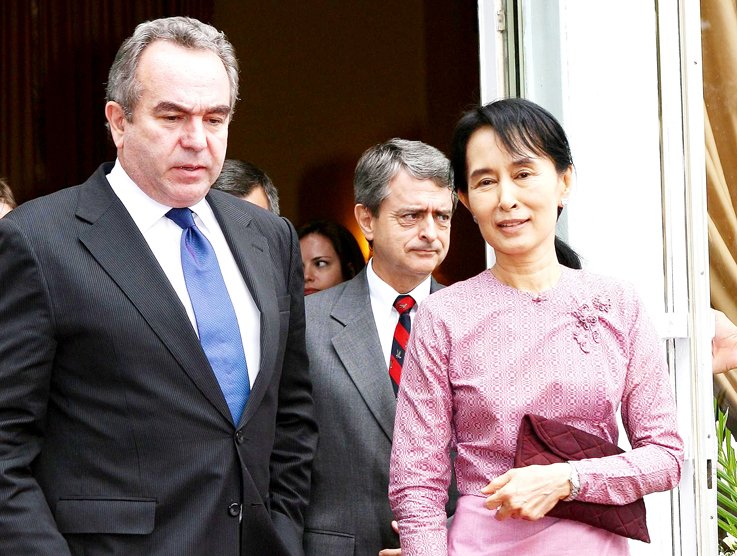A US State Department official met Aung San Suu Kyi yesterday in a visit that marked the highest-level talks between a US diplomat and Myanmar’s detained opposition leader in 14 years.
Assistant Secretary of State Kurt Campbell, the top US diplomat for East Asia, greeted Aung San Suu Kyi with a handshake after she was driven to his hotel in Yangon, US embassy spokesman Richard Mei said.
The topic of their discussion was not immediately known, but the meeting offered Aung San Suu Kyi, who wore a pink traditional Burmese jacket, her first trip in years outside the confines of her dilapidated home and Myanmar’s notorious Insein Prison.

PHOTO: EPA
The 64-year-old Nobel Peace Prize laureate has been detained for 14 of the past 20 years, mostly under house arrest.
Campbell and his deputy, Scot Marciel, are the highest-level Americans to visit Myanmar since 1995. Their trip stems from a new US policy that reverses the previous administration’s isolation of Myanmar in favor of direct, high-level talks with a country that has been ruled by the military since 1962.
Their two-day visit is the second step in “the beginning of a dialogue with Burma,” State Department spokesman Ian Kelly told reporters in Washington on Tuesday after the officials had met with senior junta officials in Myanmar’s administrative capital of Naypyitaw.
“They laid out the way we see this relationship going forward, how we should structure this dialogue,” Kelly said. “But they were mainly in a listening mode.”
Campbell is continuing talks he began in September in New York with senior Myanmar officials, which at the time were the first such high-level contact in nearly a decade.
Campbell met Burmese Prime Minister General Thein Sein yesterday morning before flying to Yangon, the commercial capital, Mei said.
Aung San Suu Kyi was recently sentenced to an additional 18 months of house arrest for briefly sheltering an uninvited American, in a trial that drew global condemnation. The sentence means she will not be able to participate in next year’s elections, which will be the first in two decades.
Campbell was scheduled to meet later in the afternoon with leaders of Aung San Suu Kyi’s National League for Democracy party at their headquarters, followed by talks with other political parties.
For years, the US had isolated the junta with political and economic sanctions, which failed to force the generals to respect human rights, release jailed political activists and make democratic reforms.
The administration of US President Barack Obama decided recently to step up engagement as a way of promoting reforms.
Washington has said that it will maintain the sanctions until talks with Myanmar’s generals result in concrete change.
Campbell was the most senior US official to visit Myanmar since a September 1995 trip by then-UN ambassador Madeleine Albright.

In his National Day Rally speech on Sunday, Singaporean Prime Minister Lawrence Wong (黃循財) quoted the Taiwanese song One Small Umbrella (一支小雨傘) to describe his nation’s situation. Wong’s use of such a song shows Singapore’s familiarity with Taiwan’s culture and is a perfect reflection of exchanges between the two nations, Representative to Singapore Tung Chen-yuan (童振源) said yesterday in a post on Facebook. Wong quoted the song, saying: “As the rain gets heavier, I will take care of you, and you,” in Mandarin, using it as a metaphor for Singaporeans coming together to face challenges. Other Singaporean politicians have also used Taiwanese songs

NORTHERN STRIKE: Taiwanese military personnel have been training ‘in strategic and tactical battle operations’ in Michigan, a former US diplomat said More than 500 Taiwanese troops participated in this year’s Northern Strike military exercise held at Lake Michigan by the US, a Pentagon-run news outlet reported yesterday. The Michigan National Guard-sponsored drill involved 7,500 military personnel from 36 nations and territories around the world, the Stars and Stripes said. This year’s edition of Northern Strike, which concluded on Sunday, simulated a war in the Indo-Pacific region in a departure from its traditional European focus, it said. The change indicated a greater shift in the US armed forces’ attention to a potential conflict in Asia, it added. Citing a briefing by a Michigan National Guard senior

CHIPMAKING INVESTMENT: J.W. Kuo told legislators that Department of Investment Review approval would be needed were Washington to seek a TSMC board seat Minister of Economic Affairs J.W. Kuo (郭智輝) yesterday said he received information about a possible US government investment in Taiwan Semiconductor Manufacturing Co (TSMC, 台積電) and an assessment of the possible effect on the firm requires further discussion. If the US were to invest in TSMC, the plan would need to be reviewed by the Department of Investment Review, Kuo told reporters ahead of a hearing of the legislature’s Economics Committee. Kuo’s remarks came after US Secretary of Commerce Howard Lutnick on Tuesday said that the US government is looking into the federal government taking equity stakes in computer chip manufacturers that

US President Donald Trump on Friday said that Chinese President Xi Jinping (習近平) told him China would not invade Taiwan while Trump is in office. Trump made the remarks in an interview with Fox News, ahead of talks with Russian President Vladimir Putin over Moscow’s invasion of Ukraine. “I will tell you, you know, you have a very similar thing with President Xi of China and Taiwan, but I don’t believe there’s any way it’s going to happen as long as I’m here. We’ll see,” Trump said during an interview on Fox News’ Special Report. “He told me: ‘I will never do